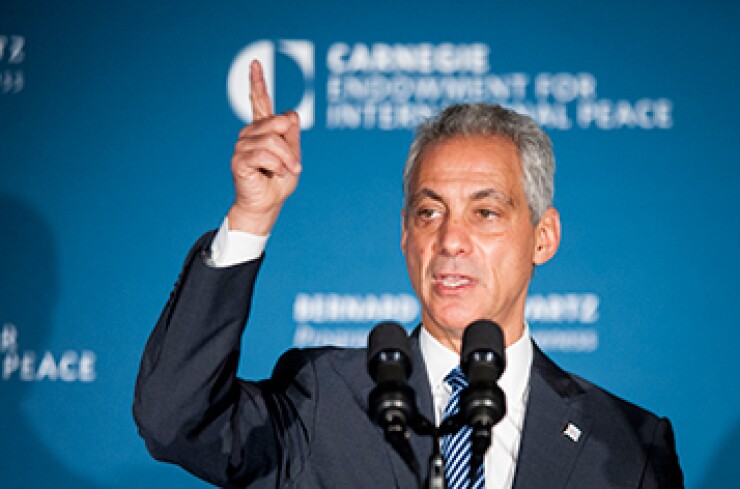CHICAGO – Chicago is moving to bypass the need for state approval -- at least temporarily – to funnel more money to two pension funds with the goal of staving off their looming insolvency and preserving the city’s stabilized credit ratings.
Mayor Rahm Emanuel introduced an ordinance Wednesday that taps the city’s home rule powers to implement the contribution piece of an overhaul of its municipal employees' and laborers’ pension funds. Various reform measures that require new employees to pay more will still have to wait for Gov. Bruce Rauner’s signature.
Emanuel said Rauner’s threatened veto left him no choice but to act on the contribution side.

“I wanted to send a clear message…..to send them a clear signal that we are going to do exactly what we said we are going to do,” Emanuel said of S&P Global Ratings and Fitch Ratings, which both have elevated the city’s outlook to stable from negative in recognition its plan to boost pension funding.
Fitch rates the city’s general obligation bonds at BBB-minus and S&P has the city at BBB-plus. “Timely action on pension funding is crucial to the city's budgetary stability….potential delays to increased contributions beyond 2017 could lead to credit deterioration,” S&P wrote in March.
The move is not without risk. The potential for litigation challenging the city’s ability to make payments in excess of the existing formula built into state law were cited by the city’s former chief financial officer and city lawyers for their reluctance in raising contributions without state law changes.
“Given the ongoing dysfunction in Springfield, the city is acting to codify in the Municipal Code the necessary pension contribution increases to the Municipal and Laborers’ pension fund to prevent these funds from going insolvent,” said city finance department spokeswoman Molly Poppe.
The former position was taken prior to the three-year absence of a state budget, a Cook County intergovernmental agreement that increased its pension contributions without state law change, and the Illinois Supreme Court ruling on Senate Bill 1922, which stated the city is obligated to make its pension payments, Poppe added.
Some have raised concerns the county’s action could also face litigation.
Rauner vetoed the city’s pension overhaul; another bill to accomplish the same thing won legislative approval but it lacks House Republican support needed to survive a threatened veto. Rauner has slammed the overhaul as too detrimental to taxpayers, but said he would sign if Emanuel uses his political muscle to help win state pension changes.
Most recently, Emanuel offered to smooth zoning changes to sell the state’s downtown Chicago headquarters which could raise about $300 million for state coffers in exchange for signing the bill that has yet to be sent to his desk. Rauner balked.
“Nothing is asked of the state,” Emanuel said after the council meeting. “The irony of his veto for Mr. Reformer is that the reform stuff are the things that are now being held back.”
The Rauner administration remains opposed with spokeswoman Eleni Demertzis saying Wednesday: "The bill the mayor wants signed is a massive property tax increase for the people of Chicago. The mayor needs to get serious about reforming Chicago's finances and stop sticking it to taxpayers."
The higher contributions rely on a water/sewer tax and 9-1-1 fees but additional revenue will be needed in 2023 when actuarially based payments take effect.
The ordinance lays out the precarious condition of both funds that are on track to exhaust assets by 2027 and reads that “in the absence of such legislation by the state, the city finds that it is necessary and advisable for the City to exercise its home rule powers to increase the required contributions by the city to MEABF and LABF.”
The city will pay towards it laborers’ fund $36 million in 2018, $48 million in 2019, $60 million in 2020, $72 million in 2021, and $84 million in 2022 as it ramps up to an actuarially based contribution in 2023 aimed at bringing the account to a 90% funded ratio in 2058. Under the current statutory formula the city pays only about $14.6 million.
The city will pay towards the larger municipal fund $266 million in 2018, $344 million in 2019, $421 million in 2020, $499 million in 2021, and $576 million in 2022 as ramps up to an actuarially payment in 2023. Under the existing statutory formula, the city is paying about $164 million.
Critics, including Moody’s Investors Service, have said the plan just stems the worsening condition of the two funds and takes more than a decade to achieve any improvements which could be dampened if investment returns fall short.
The funded ratio of the municipal fund fell to 30.5% in 2016 from 32.9% in 2015 and the funded ratio of the laborers’ fund fell to 50.36% from 52.99%. The municipal fund’s net pension liabilities increased slightly to $18.86 billion from $18.62 billion. The laborers’ plan’s net pension liability rose slightly to $2.53 billion from $2.47 billion in 2015.
The city was carrying $33.8 billion of net pension liabilities based on fiscal 2015 figures.
The actuarial reports for the year ending Dec. 31 warn that both funds are in a negative cash flow position and as they exhaust assets to cover liabilities and shift investment strategies, the ability to hit targeted return rates gets harder, and insolvency could come sooner than projected.





